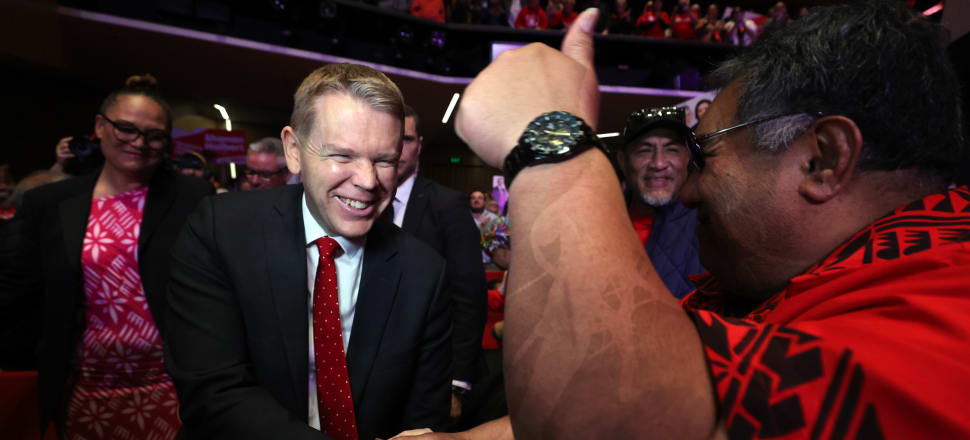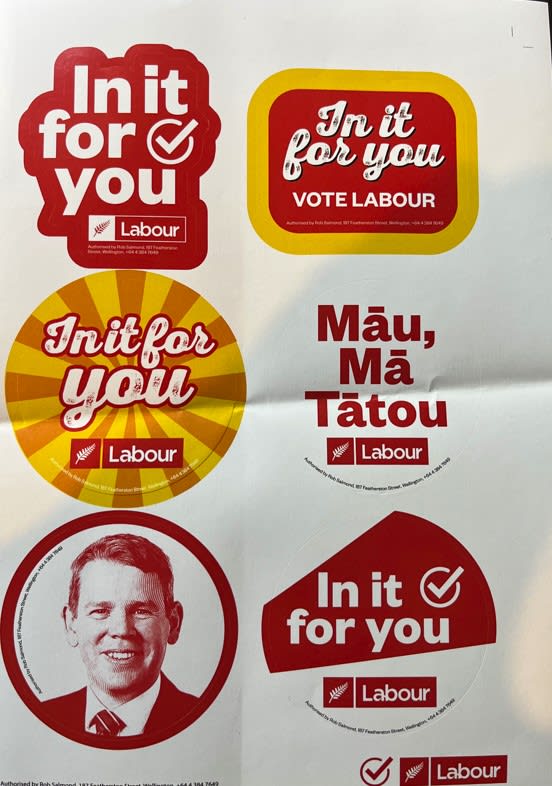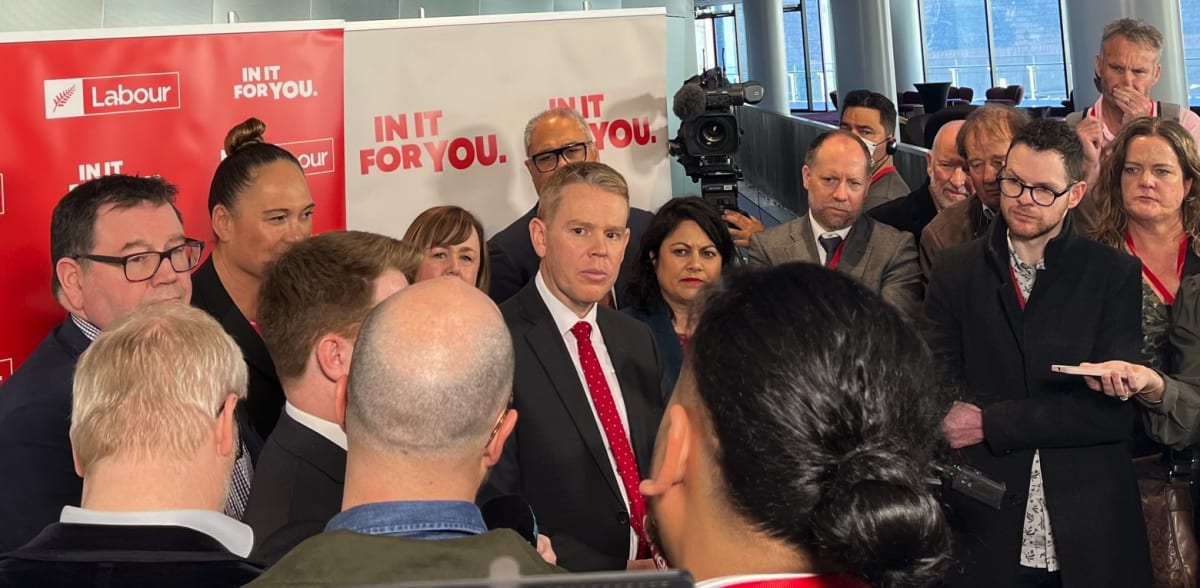
Labour leader Chris Hipkins regains his mojo, launching his party's election campaign with a big policy carrot and a lot of help from planted protesters and National's big play on tax
Chris Hipkins could be forgiven for giving silent thanks for Brian Tamaki, Nicola Willis and Marama Davidson.
For starkly different reasons, these three political figures from competing parties seem to have provided the Prime Minister, his MPs and party members with inspiration and energy that lit up their campaign launch at the Aotea Centre in Auckland.
Tamaki, because six or seven of his Vision NZ party supporters infiltrated Labour's ticket-only event and one-by-one stood in the stalls and the circle and tried to shout down speakers. Their, at-times, angry shouting struck first as former Prime Minister Helen Clark spoke, then repeatedly as Hipkins tried to deliver his centrepiece campaign speech.
TheTamaki-ites probably mistimed and miscalculated their intrusions. First, because starting the barrage during Clark's warmup speech allowed the Labour crowd to work out a way to deal with the interruption, members clearing out of the aisles to allow security access to remove the sleeper cells. Second, because the Labour faithful found their own voice, standing as one to surround the attention-seeker while clapping and raucously chanting 'Let's Go, Labour, Let's Go" until the removal was complete.
Former party president Mike Williams, who had the misfortune to have one of Tamaki's people both beside him and immediately behind him, pushed and grabbed at the uninvited protesters, holding a red "In it for you" T-shirt in their faces and giving them the edge of his never-stand-back tongue.
All the activity pulsed an energy through the auditorium. Hipkins felt it. After the first of his interruptions, he told the crowd: "It's energy like that that's going to lead us to victory in six week's time."
After the second: "I say to our friends from Vision New Zealand - if you want real vision, it's the Labour Party."
And to the Labour folk, after yet another interloper was marched out to the foyer: "Thank you for having my back. I've got yours, as well."
A campaign event that had begun with some seats still showing empty in the stalls and only a third of the Circle full, came together, came alive.

Hipkins kept his composure and used the flashes of party solidarity to humanise a serious speech that listed off all that Labour sees as achievements for the needy (the minimum wage up $7 over their time, free doctors visits extended up to 14 year-olds, free prescriptions, benefit rate increases, free and half-price public transport).
The interruptions even gave him a chance to get with the zeitgeist. Waiting to resume at one point, he chipped in: "I think this is the point in my speech where I say: 'Up the Wahs'."
His serious speech was also helped by Nicola Willis and what Labour increasingly now sees as a serious financial and political miscalculation in the framing of National's tax policy package.
Hipkins denied later that his speech had engaged in negative politics over his opponents' policy, but conceded he had "been providing scrutiny."
He claimed "National's pretend tax plan" had been shown to have a budgeting hole of billions of dollars, and "more kids in poverty should not be how you fund tax cuts."
The "pretend tax plan" later became "their tax swindle" and "National's sneaky tax cuts" as he went through what would be lost in services if tax revenues were given back to the rich.
The focus on what might be reversed if National took over in government provoked cries of "shame" from the floor.
Hipkins promised: "We are going to be doing everything we can in the next six weeks to stop that from happening."

His gratitude to Marama Davidson and the Greens could be for finally provoking Labour into action on publicly funding dental health care. The Greens went big, making dental health free for all.
Hipkins' more modest policy announcement for the campaign launch was that Labour would introduce free care for those aged up to 30, and look to make that policy universal in future.
While a half-step when compared with what Davidson announced in early August, it is a major election carrot from Labour and possibly one which could deliver votes where GST off fruit and vegetables has struggled to move the opinion polls.
It was the Clark government of the early 2000s that made dental health free for those aged up to 18. Now Labour would take that out another 12 years, covering up to 800,000 people, by Hipkins' count, by 2026.
There are doubts, as there so often have been with this government, over delivery of that policy. Just one mobile dental van of 20 promised last election is imminent, in the New Year.
But Labour has spied a health initiative with appeal. By limiting the age-lift for now, at a modest enough cost of $390m over four years, it has itself something to sell.
Hipkins was explicit that Labour's "ultimate goal was free universal dental health care for all New Zealanders" but claimed this first step was in itself a game-changer.
"These are not just policy decisions. They are moral decisions as well."
The launch showed Labour still thinks it can win. It was a far cry from the fervour of hope, in 2017, and confidence, in 2020 under Jacinda Ardern but it was obvious Labour is not overestimating its opponents, and believes it can take them on, and down.
Clark said no election was a pushover and achieving a third-term was challenging, but "It can be done."
Leading a party through a tough election was about courage. "Chris Hipkins has spades full of courage." She mentioned former Prime Minister Jacinda Ardern several times, but Hipkins' speech, even when referring to the Christchurch mosque attack and pandemic response, did not namecheck his predecessor.
On Saturday afternoon, Hipkins made the most of the opportunities that came his way from the Tamaki protesters, from Willis' tax plans and in stealing Davidson's dental thunder.
"As Helen Clark said earlier, we have been here before and we won and we're going do to that again."







